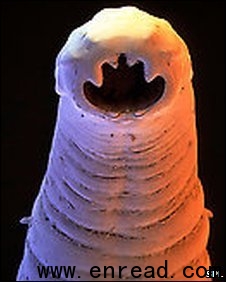| ||||||||||||||||||||||||||||||||||||||||||||||||||||||||||||||||||||||||||||||||||||||||||||||||||||||||||||||||
|
Parasitic1 gut2 worms, such as hookworm, might aid the development of new treatments for asthma3 and other allergies4, a study in Vietnam suggests. 越南一项研究显示,肠内寄生蠕虫,如十二指肠虫,可能帮助哮喘和其他过敏症新疗法的研究。  Hookworms have infected humans for thousands of years Infection with hookworm and other parasitic worms(肠内寄生蠕虫) is endemic(风土的,地方的) in Vietnam, but rates of asthma and other allergies are low. British and Vietnamese scientists gave local children treatment to clear their body of worms. They found this led to an increase in dust mite5(尘螨) allergy6 among the children. Thanks to improved hygiene7(卫生), practices parasitic worms have been mostly eradicated8 among human populations living in developed countries. However, experts believe that over millions of years of co-evolution worms have found methods to dampen(潮湿,沮丧,缓冲) down host immune responses to prolong(延长,拖延) their own survival inside humans. This relationship seems to have become so intertwined(互相缠结的) that without gut worms or other parasites10, our immune system can become unbalanced, which, in turn, could contribute to the development of asthma and other allergies. The latest study was conducted in a rural area of central Vietnam where two in every three children have hookworm and other gut parasite9 infections, and where allergies are extremely rare. More than 1,500 schoolchildren aged11 six to 17 took part. Regular tablets Some of the children were given repeated tablet treatments to clear their body of gut worms. The treatment did not produce any conclusive12 effect on rates of asthma or eczema(湿疹). However, those children who received the tablets did have a significantly increased risk of developing allergies to the house-dust mite. Up to 80% of people with asthma also have allergies to house-dust mites13 and other environmental allergens. The researchers said this strongly suggests that gut worms have the potential to tone down human immune responses. Researcher Dr Carsten Flohr, of the University of Nottingham, said: "The next step is to understand exactly how and when gut parasites programme the human immune system in a way that protects against allergies, and for such studies, follow-up from birth will be essential." The hope is that the work could aid the development of new treatments which work in the same way as gut parasites, by dampening down or rebalancing the immune system so that the body does not respond to allergens(过敏原) and trigger asthma attacks. Dr Elaine Vickers, Research Relations Manager at the charity Asthma UK, which funded the research, said: "The prospects14 of further studies in this area are very exciting as we could see groundbreaking treatments for asthma and other allergies developed as a result." 点击  收听单词发音 收听单词发音
|
||||||||||||||||||||||||||||||||||||||||||||||||||||||||||||||||||||||||||||||||||||||||||||||||||||||||||||||||
- 发表评论
-
- 最新评论 进入详细评论页>>



